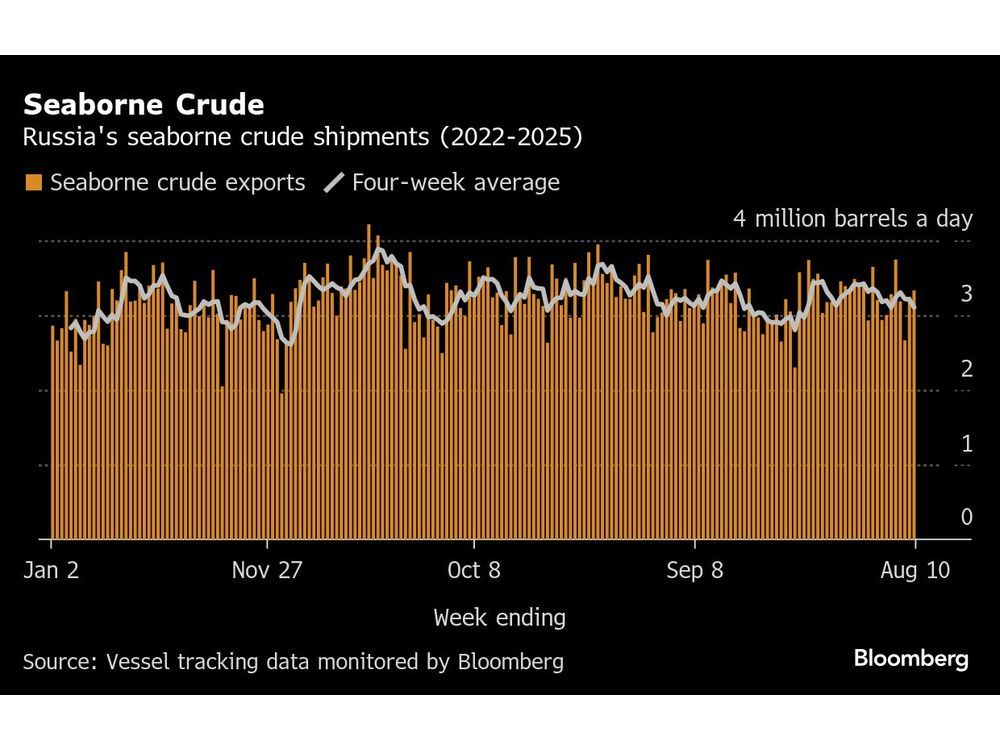Top Stories
EU Launches Urgent New Sanctions on Russian Banks and Oil Trade

UPDATE: The European Union is taking decisive action against Russia, exploring new sanctions targeting approximately six Russian banks and energy firms in a bid to pressure President Vladimir Putin to cease hostilities in Ukraine. This marks the EU’s 19th sanctions package since Russia’s full-scale invasion began in 2022.
As tensions escalate, a delegation of EU officials is set to travel to Washington this week to coordinate sanctions with the United States. Discussions will focus on joint measures aimed at crippling Russia’s economy and compelling Putin to engage in peace talks.
In a recent interview, Treasury Secretary Scott Bessent emphasized, “We are prepared to increase pressure on Russia, but we need our partners in Europe to follow.” The urgency of these sanctions is underscored by the hope that they could lead to a Russian economic “collapse,” forcing Putin back to the negotiating table.
The impending sanctions could include restrictions on Russia’s payment systems and credit card networks, as well as targeting crypto exchanges. The EU is poised to implement further limitations on the oil trade, including sanctions on sanctioned shadow vessels and oil traders in third-party countries. Additionally, bans on re-insurance for these vessels are under consideration.
With existing sanctions from the US and Europe already affecting Russia, Moscow has sought to mitigate their impact by sourcing restricted goods from China and maintaining oil trade with countries like India. The proposed sanctions aim to tighten restrictions on major Russian oil companies, including Rosneft PJSC and Lukoil PJSC, by removing existing exemptions.
Moreover, the EU is contemplating an export ban on goods used by Russia’s military industry, as well as restrictions on foreign firms that supply these items, particularly those based in China. Beijing has emerged as a crucial supplier, helping Russia enhance its drone production capabilities used in targeting Ukrainian cities.
Separately, the EU is considering deploying its “anti-circumvention tool” against Kazakhstan, a move that could ban the import of specific machinery that is being diverted to Russia for weapon production. The implementation of this tool requires robust evidence and must be supported by all EU member states.
The proposed sanctions package is still under discussion and may evolve as EU ambassadors were briefed over the weekend. Potential additional measures include visa restrictions, limitations on ports dealing with shadow vessels, and sanctions on military-related services such as artificial intelligence.
As developments unfold, the urgency of these sanctions reflects the EU’s commitment to stand firm against Russia’s aggression and support Ukraine. The EU’s formal proposal is expected within days, indicating a swift response to the ongoing crisis.
Stay tuned for more updates as this story develops, and share to keep others informed about these critical global events.
-

 World3 months ago
World3 months agoScientists Unearth Ancient Antarctic Ice to Unlock Climate Secrets
-

 Entertainment3 months ago
Entertainment3 months agoTrump and McCormick to Announce $70 Billion Energy Investments
-

 Lifestyle3 months ago
Lifestyle3 months agoTransLink Launches Food Truck Program to Boost Revenue in Vancouver
-

 Science3 months ago
Science3 months agoFour Astronauts Return to Earth After International Space Station Mission
-

 Technology2 months ago
Technology2 months agoApple Notes Enhances Functionality with Markdown Support in macOS 26
-

 Top Stories2 weeks ago
Top Stories2 weeks agoUrgent Update: Fatal Crash on Highway 99 Claims Life of Pitt Meadows Man
-

 Sports3 months ago
Sports3 months agoSearch Underway for Missing Hunter Amid Hokkaido Bear Emergency
-

 Politics3 months ago
Politics3 months agoUkrainian Tennis Star Elina Svitolina Faces Death Threats Online
-

 Technology3 months ago
Technology3 months agoFrosthaven Launches Early Access on July 31, 2025
-

 Politics3 months ago
Politics3 months agoCarney Engages First Nations Leaders at Development Law Summit
-

 Entertainment3 months ago
Entertainment3 months agoCalgary Theatre Troupe Revives Magic at Winnipeg Fringe Festival
-

 Politics2 weeks ago
Politics2 weeks agoShutdown Reflects Democratic Struggles Amid Economic Concerns




















